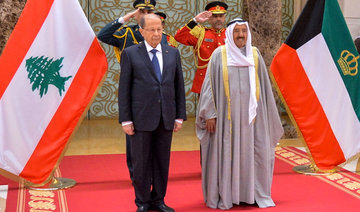BEIRUT: All Lebanese government institutions must cut their 2018 budgets by 20 percent as part of the country’s efforts to revamp its struggling economy, Prime Minister Saad Al-Hariri said on Tuesday.
Costs must be reduced “in accordance with the policy of spending rationalization and controlling public finances,” a statement from Hariri’s office said.
Lebanon’s economy has been battered by six years of war in neighboring Syria and by simmering political divisions.
After years of paralysis in government decision-making, Lebanon last year passed its first government budget since 2005.
The government is now trying to finalize the 2018 budget, in which analysts and politicians have said they hope to see serious efforts made to get the state’s finances in order.
Growth slowed from an average of eight percent before the Syrian conflict began in 2011 and the country has one of the world’s highest ratios of debt to gross domestic product, around 140 percent. 2017 growth is estimated to be about 2.5 percent.
The order to slash budgets comes ahead of a major donor conference to be held in Paris in March, at which Lebanon is expected to seek support for its economy and army and to help it deal with the approximately one million Syrian refugees the country is hosting.
The country’s crumbling infrastructure has not been overhauled since the end of a 15-year civil war in 1990 and Lebanon has plans for a 10-year $16 billion capital investment program.
Lebanon recently engaged management consultant company McKinsey to help transform the stagnating economy.
Ministries must present the amended budgets to the finance ministry within two weeks from the decree’s publication.
Hariri is attending the World Economic Forum in Davos, Switzerland this week.
Lebanese government departments must cut 2018 budgets by 20%, PM Hariri says
Lebanese government departments must cut 2018 budgets by 20%, PM Hariri says

UN rights chief urges Iran to end violent crackdown, warns against death penalty

- Volker Turk: ‘The killing of peaceful demonstrators must stop’
- Iranians’ grievances must be heard and addressed, and ‘not instrumentalized by anyone’
NEW YORK: The UN high commissioner for human rights on Tuesday urged Iran to immediately halt violence and repression against peaceful protesters, restore full access to the internet and telecommunications, and ensure accountability for serious human rights violations.
Volker Turk said he is horrified by reports of mounting violence by security forces against demonstrators across Iran, with hundreds reported killed and thousands arrested since protests erupted earlier this month.
“The killing of peaceful demonstrators must stop, and the labeling of protesters as ‘terrorists’ to justify violence against them is unacceptable,” he added.
It is “extremely worrying” to see public statements by Iranian judicial officials indicating the possible use of the death penalty against protesters through expedited judicial proceedings, Turk said.
He added that the protests echo mass demonstrations seen in 2022, with broad segments of the population demanding fundamental changes in governance.
He also criticized authorities for responding with what he described as brutal force to suppress legitimate demands.
“This cycle of horrific violence cannot continue,” he said, adding that all killings, violence against protesters and other alleged abuses must be investigated in line with international human rights standards, and those responsible held to account.
Turk also expressed alarm over reports that hospitals are overwhelmed by casualties, including children, and said nationwide internet and telecommunications shutdowns have hampered verification of events and obstructed independent human rights monitoring.
Iranian authorities imposed a nationwide internet shutdown on Jan. 8, which the UN said has disrupted freedom of expression, access to information, and emergency and lifesaving services. There are also reports that members of Iran’s security forces have been killed during the unrest.
Iranians have the right to demonstrate peacefully, Turk said, adding that their grievances must be heard and addressed, and “not instrumentalized by anyone.”














